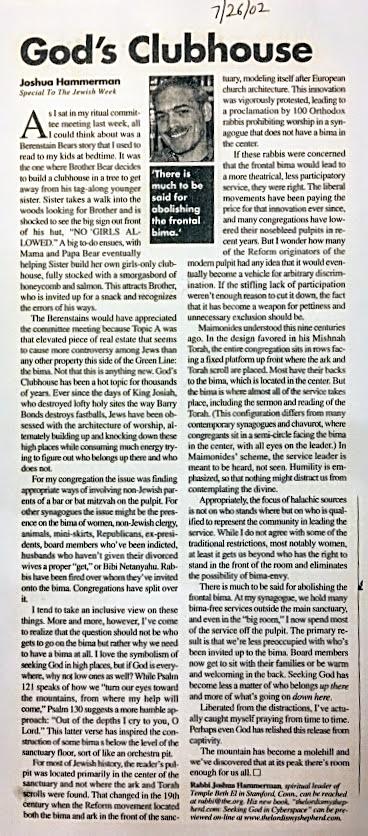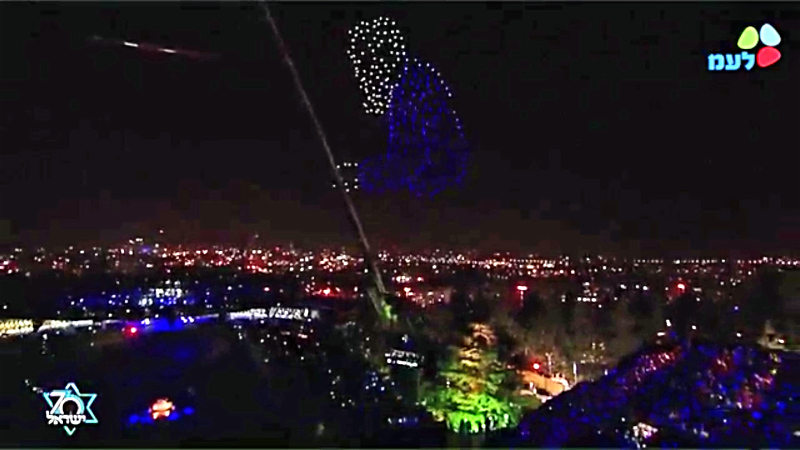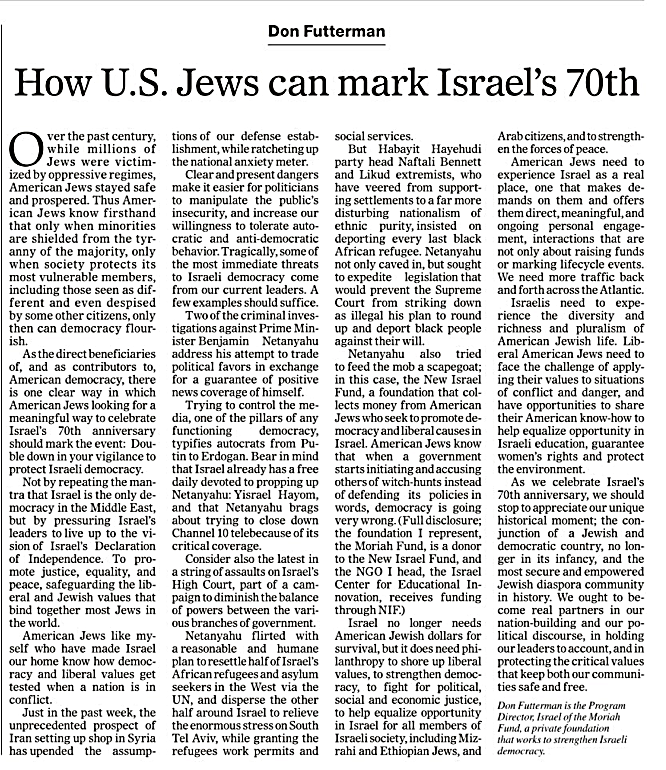Shabbat Shalom
As we look forward to Mediterranean Shabbat on Friday night and Shabbat-in-the-Round on Shabbat morning, we also turn our attention to some concerns on college campuses. This Shabbat-O-Gram features first-hand accounts from TBE students reporting from two significant flash points. Both students have given me permission to share their thoughts. I've heard from other collegians recently as well, one in the Boston area, one at UConn, and another who just visited Auschwitz while studying abroad. I've also heard from a very concerned Barnard alum. We can be really proud of what our students are doing in standing up for who they are.
The atmosphere has become more challenging than ever, making it clearer than ever before that our kids are on the front lines in a worldwide struggle to define and often malign Israel, while dredging up old anti-Semitic canards. While these front lines can't be compared to what Israeli soldiers deal with (and we look forward to welcoming some Tzahal Shalom visitors tonight), there is no denying that the pressures are great. For that reason we have a right to expect that Israel will see the need to arm us for battle, not with talking points and propaganda, but by acting in a manner that we and our children can find defensible - one in line with Jewish values.
After sharing from the students who wrote to me this week, I'll share an email from a recent grad who wrote from abroad a couple of weeks ago. We - and Israel - need to hear his concern too.
I appreciate the engagement of our students, many of whom have been to Israel on Birthright and feel much more invested than the prior generation. It also speaks to how well our community (synagogues, JCC, schools, federation, youth groups) has made Israel come alive for them. Their continued engagement needs to be a high priority for us.
Which reminds me - anyone who will be in Israel on Birthright this June and July, let me know! There could be a free Shabbat meal with our group in it for you!
-------
First an exchange with Stephanie Hausman, who goes to Syracuse:
Hi Rabbi Hammerman.
Right now the environment at Syracuse is pretty intense. Videos were released from an engineering fraternity, Theta Tau, that included ignorant and hateful sentiments towards basically every single minority group. This has resulted in a huge backlash with protests on campus and a "Recognize Us" student movement calling for action from administrators.
Even though this has all stemmed from such a horrible event, it's interesting to see diverse parts of campus come together.
I'm an assembly member for our Student Association so I've been taking an active role in everything going on. The most disheartening part of all of this is that there isn't much involvement from the Jewish students on campus. Our Hillel has been very proactive, such as speaking with students and holding discussions, but it's a two-way street and Jewish students aren't doing much to be a part of the conversation. I'm also in AEPHI, a predominantly Jewish sorority, and only about 15 of us attended the main forum the day that everything happened, which was really disappointing.
I have never felt discriminated against as a Jew at Syracuse University, and I honestly don't know many others that have either. The problem on our campus isn't anti-Semitism--I think it's apathy. Black and Latino students have been extremely loud and involved to make change, yet even though the majority of the video was hateful towards Jews, there are hardly any Jewish voices. I haven't really figured out why this is the case, but in the meantime, I'm trying to be as much of a Jewish presence in this movement as possible.
I'm curious to hear your thoughts on why Jewish students haven't been involved or any advice you have on what I can do to get them involved. I hope you're doing well and I'll keep you updated!
-Steph
My reply:
Wow - thanks for the update, Stephanie. So sorry to hear about this. Apathy is common and not relegated to college campuses. I see enough of it here too! I think many Jewish students also feel uncomfortable being seen as victims. They also have trouble believing that anti-Semitism is so prevalent, since they haven't personally experienced it. They (and we) also didn't have to grow up with it, whereas other minorities face bias all the time and are more prepared to confront it.
I think it's really important to cultivate alliances among these other groups, to show that Jews care about them - and by extension, that support for Israel does not preclude support for their concerns, but in fact the two go hand in hand. Jews on campus will take notice. Now is a real chance to strengthen those alliances.
There are so many Jews at your school that it's easy to sink into the background and ignore the problem. So it's important to meet people in small groups, or one on one, which it sounds like Hillel does.
In the end, it's best to think less about who isn't getting involved than who is - and keep growing your movement, one person at a time.
I am soooo not surprised that you are leader in this (and of course I'm less surprised, since I spoke to your mom last week).
Thanks and have courage!
Rabbi H
Thank you so much! I've really thought about everything you said and am going to focus more on the people that I know who do care and are trying to help, and to work with them as best as I can. Last night I also went to another forum about bias on campus and there were tons of administrators there taking notes and listening, which gave me hope that maybe something will change on campus.
Feel free to share my thoughts with my name, too!
- Steph
------------------
Here's an exchange I had with Maura Welt, who studies at THE George Washington University.
Hi Rabbi,
My dad forwarded me your latest newsletter which requested to hear about anti-Semitic incidents on college campuses. As you may have heard, BDS passed at GWU late last night. The resolution has been brought forward to the Student Association two years in a row now, only losing by a single vote last year.
Prior to this, our latest Student Association elections experienced a controversy surrounding the issue of anti-Semitic. The Grad Senator at Large, Brady Forrest, who was running for Vice President was called out for concerning anti-Semitic and anti-Zionist comments that he had made in the past. Here is a link to an article that explains these comments and the controversy around them.
The senate had discussed removing Brady from his post as senator, yet that evidently did not come to fruition. He however was not allowed to attend the BDS vote for obvious reasons. Last night was especially troubling because the senate voted in favor of Brady voting on the BDS resolution by proxy, despite his blatantly offensive and anti-Semitic comments. Senators failed to reach a 2/3 majority to censure Forrest. Despite many senators being members of groups such as SJP, JVP, and Divest This Time, this was still shocking. Jewish students, such as myself were left hurt and appalled, and we left the proceedings, as it became clear that the Student Association cared more about passing a resolution than it did about protecting its Jewish students from hateful rhetoric.
Earlier this year, senator Joe Vogel, was removed from his post after "missing meetings." He was the first senator to be impeached in three years. Vogel founder of "GW Together" on campus, objected that his removal was due to his pro-Israel beliefs. Yet, Brady, one of the senators who pushed for Vogel's removal and a rabid anti-Semite, was allowed to keep his post. This speaks volumes. StandWithUs shared a powerful video from last night of Joe condeming the SA for failing to stand up to anti-semitism.
Today, the president of the University came out to express that the views of the senate do not necessarily reflect the views of the university at large. This was comforting to many students who felt unsafe and unwelcomed on campus after the events that took place last night. Luckily, GW has a very close-knit Jewish community who has been very supportive of one another through this difficult time. This community includes groups like GW for Israel, J-Street, GW Together, GW Hillel, and GW Chabad.
I also read an interesting student-written opinion piece in the Forward yesterday. I don't whole heartedly agree with everything the article says, but in terms of early Jewish education it raises some valid points.
I hope that you and Mara are doing well, and maybe that I will get to see you when I am home for the summer! I am currently taking an Arab-Israeli conflict class which I am thoroughly enjoying, as constructive dialogue on the issue happens too infrequently on college campuses.
Best,
Maura
Hi Maura
I just read your email and thought the article I sent out to the congregation today might be helpful, as well as the Hoffman Lecture video with Beinart and Gordis, if you have time to watch it. I really feel for what you are going through. It sounds really bad - but also constructive, as Jewish students are becoming more engaged - and impressively unified. I've also heard some disturbing things from other campuses too.
I think that Forward article you linked to is helpful. In Stamford we've tried to prepare kids to engage with Israel in a comprehensive and nuanced way, but it's hard to prepare people for what they are going to face on campus - and this year has been particularly challenging. Combine the old BDS stuff on the left with the new infusion of White Supremacist anti-Semitism, which has been given lots of winking approval from the White House, and then throw in a combustible situation in Gaza and Syria, plus the disintegration of social media into a chaotic, uncivil mess, and voila.
Anyway, just know that Mara and I are here for you. You are doing a great job and we are very proud!
Keep the faith!
Rabbi H
----------
And here is the third correspondence:
Dear Rabbi Hammerman,
I hope everything is going well with you!
I know we don't often see eye to eye on Israel/Palestine issues, but I thought the recent news out of Gaza was an extremely troubling omission in this week's Shabbat-O-Gram. I want to be clear that I don't think it is by definition a responsibility of diaspora Jewish clergy to comment on Israel, but by consistently pushing a connection to the modern state in our congregation I believe you have a responsibility to address when it acts in conflict with Jewish values (a daily occurrence, but this is particularly egregious).
I applaud your continued effort to teach Judaism's relationship to pressing issues of the day. Your loud, active push against the proliferation of gun violence was particularly moving. However, your silence in the face of gun violence of a different nature makes me uneasy.
We read the Passover story every year to remind ourselves of the need for liberation in all forms. The state of Israel slaughtered peaceful protesters in Gaza simply for demanding basic human rights and freedoms, similar to the liberation demanded by our ancestors in Egypt. Their metaphorical plea of "next year in Jerusalem" were way more real than at our seder tables, yet they were fired upon for this by a state that our community supports for somehow relating to and representing our values. I am disappointed and disturbed that you did not feel this injustice-particularly at this time in the Jewish calendar-was worth discussing.
Best, _____
I hope everything is going well with you!
I know we don't often see eye to eye on Israel/Palestine issues, but I thought the recent news out of Gaza was an extremely troubling omission in this week's Shabbat-O-Gram. I want to be clear that I don't think it is by definition a responsibility of diaspora Jewish clergy to comment on Israel, but by consistently pushing a connection to the modern state in our congregation I believe you have a responsibility to address when it acts in conflict with Jewish values (a daily occurrence, but this is particularly egregious).
I applaud your continued effort to teach Judaism's relationship to pressing issues of the day. Your loud, active push against the proliferation of gun violence was particularly moving. However, your silence in the face of gun violence of a different nature makes me uneasy.
We read the Passover story every year to remind ourselves of the need for liberation in all forms. The state of Israel slaughtered peaceful protesters in Gaza simply for demanding basic human rights and freedoms, similar to the liberation demanded by our ancestors in Egypt. Their metaphorical plea of "next year in Jerusalem" were way more real than at our seder tables, yet they were fired upon for this by a state that our community supports for somehow relating to and representing our values. I am disappointed and disturbed that you did not feel this injustice-particularly at this time in the Jewish calendar-was worth discussing.
Best, _____
Hi ____
Your comments are totally fair. Given the plethora of urgent issues right now, it's impossible to give each situation a fair shake. Right now I am apoplectic about free speech and press freedom, as exemplified most recently by revelations about Sinclair. As a fellow journalist, I think you can understand my first-amendment concerns. But I haven't gone whole hog into that one yet. This week is Earth Day and I intend to focus on environmental matters, and next week is Yom Haatzamaut and Israel 70, so I will undoubtedly find a way to address Gaza and other matters regarding Israel over the coming weeks. BTW, we've been doing a year long course on Israel that has been really good - coordinated by the Hartman Institute. And if you did not catch the Hoffman Lecture last November, with Peter Beinart and Daniel Gordis, it's definitely worth a watch.
I'm greatly concerned about Gaza - IMHO, it is symptomatic less of Israel's longstanding policies than of Netanyahu's attempt to distract from his legal woes by demonizing the enemy (even more than Israelis already have), assisted by Defense Minister Liberman. Hamas is not innocent here either.
Anyway, thanks for reading and keeping up - and keep after me! You can be sure that, while I always try to be fair when it comes to Israel, and will never stop loving Israel, I will continue to hold it up to a high standard.
Regards,
Rabbi H
God's Clubhouse
As we celebrate my 30 years here, I've been rummaging through articles I've written over the years. This piece from 2002 is not among those that I would consider my most influential, but it chronicles an important transition that occurred here, as well as an evolution my own thinking. The moment we shifted the center of gravity from the pulpit to the pew, we instantly became more inclusive and participatory. I stepped off the Bimah and begin to sit in the front row, breaking the proverbial "fourth wall" that separates spectator from performer. Since then, we haven't looked back. See the transcribed article below the photo:

As I sat in my ritual committee meeting last week, and all I could think about was a Berenstain Bears story that I used to read to my kids at bedtime. It was the one where Brother Bear decides to build a clubhouse up in a tree to get away from his tag-along younger sister. Sister takes a walk into the woods looking for Brother and is shocked to see the big sign out front of his hut, “NO GIRLS ALLOWED.” A big to-do ensues, with Mama and Papa Bear eventually helping Sister to build her own girls-only clubhouse, fully stocked with a smorgasbord of honeycomb and salmon. This attracts Brother, who is invited up for a snack and recognizes the errors of his ways.
The Berenstains would have appreciated the committee meeting, because Topic A was that elevated piece of real estate that seems to cause more controversy among Jews than any other property this side of the Green Line: the Bimah. Not that this is anything new. God’s Clubhouse has been a hot topic for thousands of years. Ever since the days of King Josiah, who destroyed lofty holy sites as often as Barry Bonds destroys fastballs, Jews have been obsessed with the architecture of worship, alternately building up and knocking down these high places, while consuming oodles of energy trying to figure out who belongs up there and who does not.
For my congregation, the issue was finding appropriate ways of involving non-Jewish parents of a Bar or Bat Mitzvah on the pulpit. For other synagogues the issue might be the presence on the Bimah of women, non-Jewish clergy, animals, mini-skirts, Republicans, ex-presidents, board members who’ve been indicted, husbands who haven’t given their divorced wives a proper “get,” or Bibi Netanyahu. Rabbis have been fired over whom they’ve invited onto the Bimah. Congregations have split over it. No doubt even Stan and Jan Berenstain have been burned by a Bimah snub at some point.
I tend to take an inclusive view when it comes to these things; but more and more I’ve come to realize that the question shouldn’t be who gets to go on the Bimah, but rather why we need to have a Bimah at all. I love the symbolism of seeking God in high places, but if God is everywhere, why not low ones as well? While Psalm 121 speaks of how we “turn our eyes toward the mountains, from where my help will come,” Psalm 130 suggests a more humble approach: “Out of the depths I cry to you, O Lord.” This latter verse has inspired the construction of some Bimahs below the level of the sanctuary floor, sort of like an orchestra pit.
For most of Jewish history, the reader’s pulpit was located primarily in the center of the sanctuary and not where the ark and Torah scrolls were found. That changed in the 19th century, when the Reform movement located both the Bimah and ark in the front of the sanctuary, modeling itself after European church architecture. This innovation was vigorously protested, leading to proclamation by 100 Orthodox rabbis prohibiting worship in a synagogue that does not have a Bimah in the center.
If these rabbis were concerned that the frontal Bimah would lead to a more theatrical, less participatory service, they were right. The liberal movements have been paying the price for that innovation ever since, and many congregations have lowered their nosebleed pulpits in recent years. But I wonder how many of the Reform originators of the modern pulpit had any idea that it would eventually become a vehicle for arbitrary discrimination. If the stifling lack of participation weren’t enough reason to cut it down, the fact that it has become a weapon for pettiness and unnecessary exclusion should be.
Maimonides understood this nine centuries ago. In the design favored in his Mishnah Torah, the entire congregation sits in rows facing a fixed platform up front where the ark and Torah scroll are placed. Most have their backs to the Bimah, which is located in the center. But the Bimah is where almost all of the service takes place, including the sermon and reading of the Torah. (This configuration differs from many contemporary synagogues and Havurot, where congregants sit in a semi-circle facing the Bimah in the center, with all eyes on the leader.) In Maimonides’ scheme, the service leader is meant to be heard, not seen; humility is emphasized, so that nothing might distract us from contemplating the divine. In the 17th-century Altneuschul in Prague, this concept is brought to an extreme: the Bimah is enclosed in a wrought iron cage (a great idea for tag-team wrestling, but please do not try this on your local clergy).
Appropriately, the focus of Halachic sources is not on who stands where, but on who is qualified to represent the community in leading the service. While I do not agree with some of the traditional restrictions (excluding unbearded men, for instance, or a person who pronounces an aleph as an ayin, or one suspected of being a “freethinker;” oh yes, and women) at least it gets us beyond who has the right to stand in the front of the room and eliminates the possibility of Bimah-envy.
There is much to be said for abolishing the frontal Bimah. At my synagogue, we hold many Bimah-free services outside the main sanctuary, and even in the “big room,” I now spend most of the service off the pulpit. The primary result is that we’re less preoccupied with who’s been invited to God’s Clubhouse. Board members now get to sit with their families or be warm and welcoming in the back. Seeking God has become less a matter of who belongs up there and more of what’s going on down here. Liberated from the distractions, I’ve actually caught myself praying from time to time. Perhaps even God has relished this release from wrought iron captivity. The mountain has become a molehill and we’ve discovered that at its peak there’s room enough for us all.
The Berenstains would have appreciated the committee meeting, because Topic A was that elevated piece of real estate that seems to cause more controversy among Jews than any other property this side of the Green Line: the Bimah. Not that this is anything new. God’s Clubhouse has been a hot topic for thousands of years. Ever since the days of King Josiah, who destroyed lofty holy sites as often as Barry Bonds destroys fastballs, Jews have been obsessed with the architecture of worship, alternately building up and knocking down these high places, while consuming oodles of energy trying to figure out who belongs up there and who does not.
For my congregation, the issue was finding appropriate ways of involving non-Jewish parents of a Bar or Bat Mitzvah on the pulpit. For other synagogues the issue might be the presence on the Bimah of women, non-Jewish clergy, animals, mini-skirts, Republicans, ex-presidents, board members who’ve been indicted, husbands who haven’t given their divorced wives a proper “get,” or Bibi Netanyahu. Rabbis have been fired over whom they’ve invited onto the Bimah. Congregations have split over it. No doubt even Stan and Jan Berenstain have been burned by a Bimah snub at some point.
I tend to take an inclusive view when it comes to these things; but more and more I’ve come to realize that the question shouldn’t be who gets to go on the Bimah, but rather why we need to have a Bimah at all. I love the symbolism of seeking God in high places, but if God is everywhere, why not low ones as well? While Psalm 121 speaks of how we “turn our eyes toward the mountains, from where my help will come,” Psalm 130 suggests a more humble approach: “Out of the depths I cry to you, O Lord.” This latter verse has inspired the construction of some Bimahs below the level of the sanctuary floor, sort of like an orchestra pit.
For most of Jewish history, the reader’s pulpit was located primarily in the center of the sanctuary and not where the ark and Torah scrolls were found. That changed in the 19th century, when the Reform movement located both the Bimah and ark in the front of the sanctuary, modeling itself after European church architecture. This innovation was vigorously protested, leading to proclamation by 100 Orthodox rabbis prohibiting worship in a synagogue that does not have a Bimah in the center.
If these rabbis were concerned that the frontal Bimah would lead to a more theatrical, less participatory service, they were right. The liberal movements have been paying the price for that innovation ever since, and many congregations have lowered their nosebleed pulpits in recent years. But I wonder how many of the Reform originators of the modern pulpit had any idea that it would eventually become a vehicle for arbitrary discrimination. If the stifling lack of participation weren’t enough reason to cut it down, the fact that it has become a weapon for pettiness and unnecessary exclusion should be.
Maimonides understood this nine centuries ago. In the design favored in his Mishnah Torah, the entire congregation sits in rows facing a fixed platform up front where the ark and Torah scroll are placed. Most have their backs to the Bimah, which is located in the center. But the Bimah is where almost all of the service takes place, including the sermon and reading of the Torah. (This configuration differs from many contemporary synagogues and Havurot, where congregants sit in a semi-circle facing the Bimah in the center, with all eyes on the leader.) In Maimonides’ scheme, the service leader is meant to be heard, not seen; humility is emphasized, so that nothing might distract us from contemplating the divine. In the 17th-century Altneuschul in Prague, this concept is brought to an extreme: the Bimah is enclosed in a wrought iron cage (a great idea for tag-team wrestling, but please do not try this on your local clergy).
Appropriately, the focus of Halachic sources is not on who stands where, but on who is qualified to represent the community in leading the service. While I do not agree with some of the traditional restrictions (excluding unbearded men, for instance, or a person who pronounces an aleph as an ayin, or one suspected of being a “freethinker;” oh yes, and women) at least it gets us beyond who has the right to stand in the front of the room and eliminates the possibility of Bimah-envy.
There is much to be said for abolishing the frontal Bimah. At my synagogue, we hold many Bimah-free services outside the main sanctuary, and even in the “big room,” I now spend most of the service off the pulpit. The primary result is that we’re less preoccupied with who’s been invited to God’s Clubhouse. Board members now get to sit with their families or be warm and welcoming in the back. Seeking God has become less a matter of who belongs up there and more of what’s going on down here. Liberated from the distractions, I’ve actually caught myself praying from time to time. Perhaps even God has relished this release from wrought iron captivity. The mountain has become a molehill and we’ve discovered that at its peak there’s room enough for us all.
Shabbat Shalom,
Rabbi Joshua Hammerman



